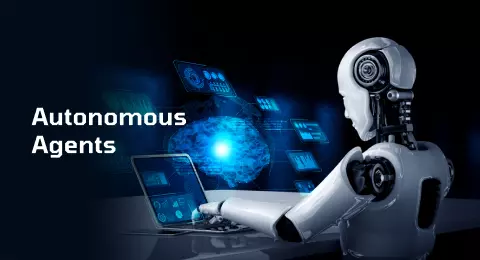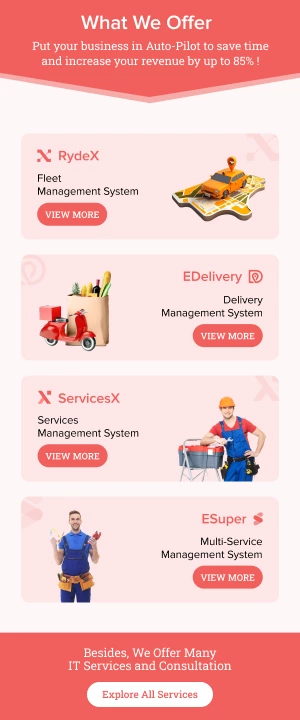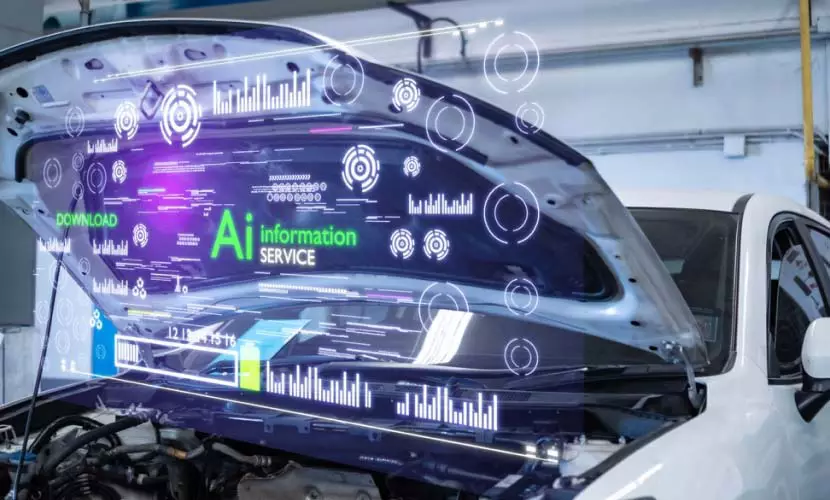
Think of a world where cars drive themselves, predict mechanical issues like brake failures before they happen, and even deliver personalized travel experiences to customers. This is no longer a futuristic concept but rather a reality facilitated by artificial intelligence, which employs sophisticated algorithms to enhance the automotive sector.
- What is AI in the Automotive Industry?
- Explore the Groundbreaking Benefits of AI in Automotive Industry
- Top 6 Real-World Use Cases of AI in Automotive Industry
- Explore the Potential Challenges & Effective Solutions for Implementing AI in the Automotive Industry
- Future of AI in Automotive Industry – Dive Deep Into Its Emerging Trends
- How Elluminati Can Help You in Powering Your Automotive Business with AI
- FAQs
In today’s world, AI in the automotive industry is not just about automation; it is driving innovation in the sector. It empowers manufacturers to build safer cars, enhances production efficiency, and optimizes fleet management for businesses. Looking to explore more details on how AI impacts the entire automotive industry? Then this comprehensive blog is for you.
What is AI in the Automotive Industry?
AI in the automotive industry goes far beyond just developing autonomous, or self-driving, cars. It involves advanced, cutting-edge technologies such as machine learning, deep learning, and computer vision to enhance safety, optimize vehicle performance, and improve the manufacturing and customer experience.
From design and smart manufacturing to predictive maintenance and personalized driving experiences, AI’s contributions to automotive businesses are opening the door to innovation, efficiency, and safer mobility services. As artificial intelligence continues to evolve, it is reshaping how the global automotive industry operates.
According to MarketsandMarkets, the demand for AI in the automotive industry is projected to reach USD 38.45 billion in 2030, with a CAGR of 15.3% from 2025 to 2030. This rapid growth, which focuses on automation, connected vehicles, and smart mobility solutions, has accelerated AI adoption across manufacturing, logistics, and vehicle management systems.
Explore the Groundbreaking Benefits of AI in Automotive Industry
Artificial intelligence doesn’t just run your car’s software; it also helps you design the car of your comfort, making it one of the key benefits that have inspired forward-thinking businesses to invest in AI technologies.

Now, let’s take a closer look at some of the other benefits of AI in the automotive industry that are equally contributing to shaping its future.
Enhanced Safety
One of the core benefits is its ability to drastically improve road safety by implementing highly efficient safety systems, such as Advanced Driver Assistance Systems (ADAS), Lane Departure Warning (LDW), and Autonomous Emergency Braking (AEB). It can predict accidents in real-time, reduce human error, and help automotive businesses make roads safer for their customers.
Improves Efficiency & Cost Optimization
By leveraging an AI-driven system, automotive businesses can optimize their workflows and streamline operations across almost every aspect of the business, from design to manufacturing. It also proactively detects potential issues, prevents delays, and reduces wastage, leading to significant cost savings and operational efficiency.
Environmental Impact
Adopting AI-driven solutions also helps businesses in moving towards a greener, more sustainable future. Through smart fuel management, real-time route optimization, and EVs, AI significantly reduces emissions. These AI-driven insights not only improve battery performance in EVs but also make operations more eco-conscious.
Personalized User Experience
With AI, businesses can deliver an unmatchable personalized experience to their users, from adjusting seat positions and music volumes to adjusting climate and setting lighting to suit individual preferences. One of the good-to-go examples for this is Tesla’s Autopilot.
Data-Driven Insights
Another valuable benefit of AI in the automotive industry is that it provides data-driven insights to businesses. Every time a car drives on the road, AI generates insights about driver behavior, performance, and driving patterns. In fact, in today’s world, data truly is your goldmine; by analyzing it, businesses can identify key pain points, understand customer needs, and make smarter, more strategic decisions to enhance their operations.
Predictive Vehicle Maintenance
We’ve all experienced a sudden vehicle issue that delays our travel plans, right? However, by integrating AI with the Internet of Things (IoT), businesses can predict and prevent such issues before they occur. IoT-enabled sensors track real-time vehicle condition by analyzing the vast amount of data, enabling businesses to determine when maintenance is required. This reduces downtime and last-minute maintenance costs while also boosting overall business performance.
Faster Innovation & Time-to-Market
Gone are the days when getting a new car model from sketch to showroom could take years. In this digital landscape, AI is also reshaping the manufacturing processes. By utilizing advanced AI technologies, including Natural Language Processing (NLP) & Computer Vision, businesses can accelerate the design, testing, and production cycle. This results in faster time-to-market while also leveraging other competitive benefits.
Ready to Bring Innovation to Your Automotive Business with AI? Tell Us Your Requirements, & We’ll Help You Build a Tailored AI Solution.
Top 6 Real-World Use Cases of AI in Automotive Industry
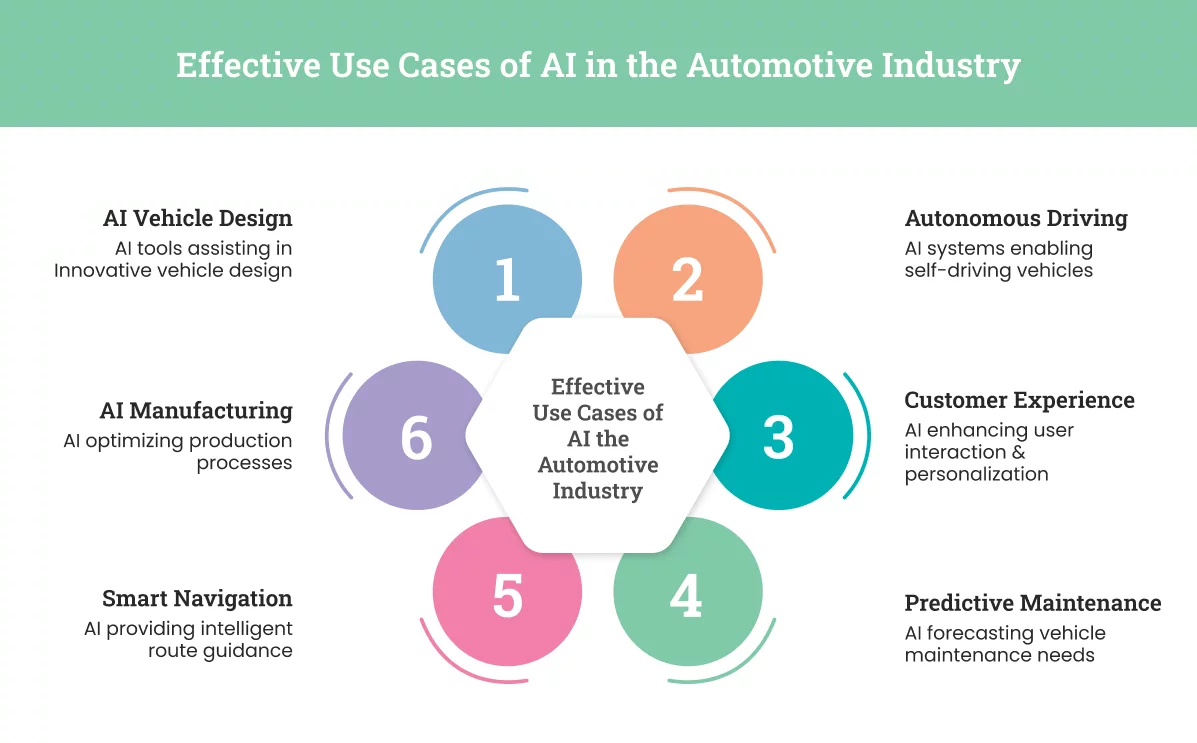
AI is bringing significant transformation to the automotive industry. From design and manufacturing to daily operations and maintenance, it is enabling innovations such as autonomous driving, real-time vehicle connectivity, and predictive maintenance.
Below are some of the real-world applications of AI that demonstrate why leading businesses are swiftly implementing AI-driven systems to improve performance and elevate customer satisfaction.
Autonomous Vehicles & Self-Driving Technology
One of the prominent applications of AI in the automotive industry is autonomous vehicles. This driverless car relies on AI technologies, such as machine learning, deep learning, and natural language processing, to analyze data from sensors, cameras, and LiDAR systems, enabling self-driving capabilities by addressing challenges such as reducing traffic accidents and improving mobility for those unable to drive.
A leading example of this technology is Waymo. It combines sensor fusion and AI-based path planning to navigate complex environments, which results in enhanced road safety, optimized mobility, and improved user convenience. In fact, for businesses, it opens the way towards making smarter mobility solutions by enabling autonomous fleets that redefine the future of transportation.
Enhanced Customer Experience
AI enables businesses to connect with customers more effectively through quicker, smarter, and more personalized interactions. Technologies such as NLP and ML help analyze and understand customer behavior, preferences, and needs. Consequently, AI applications in the automotive industry help businesses enhance communication and increase customer satisfaction.
AI-powered chatbots are a significant example of how AI enhances customer experiences. It offers real-time support by answering questions and helping customers find the vehicle information they need. This not only enhances customer satisfaction but also helps businesses build stronger relationships, grow sales, and make smarter decisions.
Predictive Analytics & Maintenance
Keeping vehicles on the road and reducing unplanned downtime are among the most significant applications of AI in the automotive industry. Using IoT sensors and AI-driven algorithms, systems detect potential issues by analyzing real-time performance data. This proactive approach minimizes breakdowns, reduces downtime, and extends vehicle lifespan.
By implementing predictive analytics & maintenance, it improves vehicle reliability, extends component lifespan, and enhances customer satisfaction. This enables manufacturers and fleet operators to optimize maintenance schedules and reduce operational costs. Predicting issues early not only enhances reliability but also strengthens customer trust & satisfaction.
AI-Powered Vehicle Design & Engineering
AI is transforming vehicle design through automation and data-driven insights. By leveraging gen AI technology, it allows businesses to analyze vast datasets, including material properties and performance metrics, to create innovative designs that lead to more efficient, lightweight, and high-performing vehicles.
A key example to check out for this is Ford. This company uses AI agents to convert 2D sketches into 3D models and to conduct stress analyses. This drastically shortens design time, improves product precision, accelerates time-to-market, and enhances competitiveness.
AI in Manufacturing & Quality Control
AI-driven automation is transforming car manufacturing by improving precision and quality control. By leveraging ML & computer vision capabilities, businesses can analyze data from sensors in real time, preventing defects and ensuring consistent quality standards and higher accuracy.
There is nothing wrong with saying that implementing AI in manufacturing leads to higher product quality, increased efficiency, and cost savings. Also, it supports flexible manufacturing systems that can adapt to changing production requirements.
Smart Navigation & Route Optimization
Route planning and optimization are other critical use cases of AI in the automotive industry. Nowadays, most vehicles are equipped with an AI-powered route optimization algorithm that analyzes traffic patterns, weather conditions, roadblocks, and other factors to reach the destination and suggest the most efficient route.
AI algorithms also recommend the best path for drivers and fleets to reduce travel time, fuel consumption, and emissions.
Explore the Potential Challenges & Effective Solutions for Implementing AI in the Automotive Industry
Implementing AI in the automotive industry holds massive potential, from enhancing efficiency to enabling autonomous mobility. On the other hand, the journey of integrating AI into systems comes with its own set of challenges and complexities that businesses are facing.
So, let’s address some of the vital challenges businesses frequently face, along with effective solutions.
Data Privacy & Security
When it comes to integrating AI, the collection and processing of vast amounts of data are vital, raising concerns about data privacy and security. Unauthorized access or breaches of data security can damage businesses’ reputations and user trust.
Solutions:
To overcome this roadblock, it is essential to enforce robust data encryption that complies with privacy regulations and security standards such as GDPR. Moreover, conducting regular audits and adopting strong cybersecurity measures are the key ways to safeguard crucial information from unauthorized access and maintain data integrity.
High Implementation Costs
One of the biggest challenges of AI in the automotive industry is the high cost of adoption, specifically for small and medium-sized businesses. Implementing AI requires robust infrastructure and software, as well as onboarding AI experts to design the solution.
Solution:
The best way to overcome this challenge is to begin with small steps. For instance, start with integrating specific AI-powered features that add the most value to your business. Later, scale your investments as your operations grow, ensuring a balanced approach that delivers ROI without straining your budget.
Integration with Legacy Systems
In this era of technological advancement, where every business leverages technology to boost operations, many still rely on outdated systems. Therefore, when it comes to incorporating AI into legacy systems, it can lead to significant inefficiencies, slow down operations, and even increase implementation complexity.
Solution:
To overcome this obstacle, it is vital to adopt modular, API-first architectures that allow seamless AI integration. Also, opting for middleware solutions to securely exchange data and other information ensures a smooth, scalable transition towards digital transformation.
In-House Team Skill-Up
AI is evolving across every business sector, driving a high demand for professionals with expertise in both AI and automotive systems. Hiring delays and other significant factors often slow down the project processes.
Solution:
The best way to address this challenge is to invest in upskilling your in-house employees through specialized training programs and to book an AI consultancy with an expert. This ensures your workforce stays capable, confident, and competitive in this evolving landscape.
Future of AI in Automotive Industry – Dive Deep Into Its Emerging Trends
AI-Driven Connectivity
AI-driven connectivity is one of the emerging key future trends shaping the next generation of intelligent vehicles. By integrating cars with IoT ecosystems, cloud platforms, and smart devices, AI enables seamless communication and data sharing across systems. This advancement enhances driver experiences and paves the way for fully connected and automated mobility networks.
Fully Autonomous Driving
Advancements in autonomous driving cars are shaping the future of mobility by enabling vehicles to become more self-reliant through AI-powered sensor fusion, computer vision, and decision-making algorithms. According to a report, the fully autonomous driving market is poised for remarkable growth, with an expected CAGR of 17.1% from 2025 to 2035, driven by technological advancements and customer demand for safer, more convenient travel solutions.
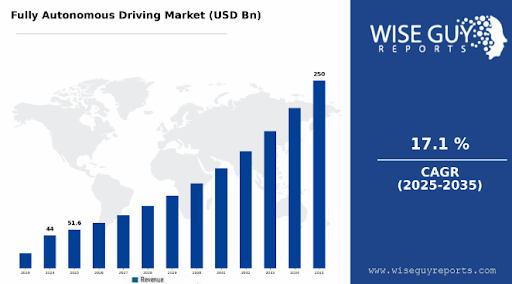
Source: WISE GUY REPORTS
AI-Driven Sustainability & Electric Vehicles
AI is a key driver of sustainable mobility by helping automakers optimize energy usage and enhance battery performance. It also supports eco-friendly manufacturing through smarter resource management and process automation. The future of AI in the automotive industry is closely tied to creating greener operations and promoting environmentally responsible transportation.
How Elluminati Can Help You in Powering Your Automotive Business with AI
AI in the automotive industry is redefining the entire mobility service, from how cars are designed and manufactured to how they operate and evolve on the road. By integrating AI, businesses can achieve smarter decision-making, higher efficiency, and safer driving experiences.
This is the perfect time for an automotive business to keep AI at the forefront and leverage its technology to augment possibilities and reach ultimate business goals. If you are also looking for ways to adopt AI to revolutionize your automotive business, then collaborating with Elluminati, a trusted AI development company, is the ideal choice for you.
Our team of developers helps you transform your operations, enhance efficiency, and gain a competitive edge by delivering a customized, innovation-driven solution tailored to your business goals.
FAQs
AI is being applied across various operations of the automotive industry, including predictive maintenance, autonomous driving, and delivering personalized in-car experiences. This helps automotive businesses to optimize operations, enhance safety, and deliver smarter mobility solutions.
Several leading automotive companies that have adopted artificial intelligence into their operations to stay ahead of the curve are
- Tesla
- Waymo
- BMW
- Nvidia
By leveraging AI, automotive businesses can reap multiple benefits, including delivering personalized customer experiences, optimizing manufacturing processes, and enhancing operational efficiency, while also driving innovation and market competitiveness.
AI-powered systems such as advanced driver assistance systems (ADAS), fatigue detection, and real-time driver monitoring can significantly reduce the chances of road accidents by alerting drivers to potential hazards, enabling automatic braking, and ensuring timely responses during critical situations.
The latest generative AI trends in the automotive industry are;
- Rapid Prototyping & Decision Optimization
- Personalized Vehicle Configurations,
- Intelligent Manufacturing Processes,
- Advanced Conversational AI for Customer Services, among others

